Elijah Wald – Global Minstrels
[Home] [Bio] [Jelly Roll Blues] [Robert Johnson] [Dave Van Ronk] [Narcocorrido] [Dylan Goes Electric] [Beatles/Pop book] [The Dozens] [Josh White] [The Blues] [Hitchhiking] [Other writing] [Musical projects] [Joseph Spence]
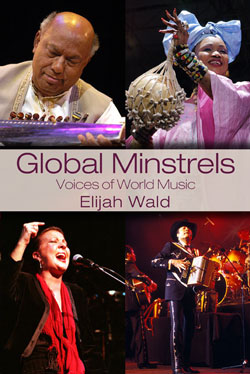 Global Minstrels:
Global Minstrels:
Voices of World Music
Routledge Press, 2006
With photos by Jack and Linda Vartoogian
"Elijah Wald's book, a collection of vignettes and interviews with some
of World Music's greatest stars, is an absolute page-turner."
--Megan Romer, About.com: World Music
"Perhaps the most significant contribution of Global Minstrels is the way it helps to rehumanize the discussion of world music by allowing the voices of the artists themselves...to be heard above the din of academic debate."
.--Ethnomusicology
"Former Boston Globe world music critic Elijah Wald’s
new book covers the key artists and performers from five continents,
while also offering the complete novice a thorough introduction to
international sounds and letting the musicians themselves explain what
they’re doing through a series of interviews. Whether explaining the differences between
Southern and Central African sounds, taking readers through the network
of Latin American genres, examining Europe and Arabic styles or
exploring in Hawaiian and Native American music its links to other
cultures, Wald does an admirable and commendable job of explanation
without oversimplification."
--Ron Wynn, Nashville City Paper
A collection of conversations with some of the foremost musicians and singers on the "world music" scene, this book is an attempt to both provide a survey of that scene and explore the similarities and differences of musical experiences around the globe. In the last twenty years, the United States has seen an explosion of international recordings and concerts, fueled both by a growing interest among mainstream listeners and by the huge influx of new immigrants.
Global Minstrels includes interviews with many of the most popular international concert artists--Paco de Lucia, Ravi Shankar, King Sunny Ade--as well as performers who are little known outside their own communities, be they Caribbean, African, or Native American. Some are studious classicists, some good-time dance bands, and some deeply rooted folk artists.
The book is divided into geographical regions, each introduced with a few paragraphs about its special characteristics and concerns, and some exploration of how it has been treated in the world music boom. The idea is to give a broad picture of the world music scene, largely from the perspective of the artists themselves. It shows the links between musicians in many different cultures, their shared concerns and challenges, and the differences and similarities in their lives.
"Elijah Wald is a strong, knowledgeable
writer with a real gift for synthesis and a diversity of experience
that makes him capable of looking at the big picture."
--Ned Sublette, author of Cuba and its Music: From
the First Drums to the Mambo
"I found this book a fascinating exploration.
I have often wondered about this term 'world music' and frankly what
it means and what its relevance is. This book helped me get closer to
an answer while bringing so many artists from around the world to me--
who they are, where they come from and what their lives are like, politically,
culturally and artistically, that makes them so powerful. This book
will help all those interested to explore the artists, their homelands
and their traditions."
--Kayhan Kalhor, founder of Ghazal and the Masters of Persian Music
Table of Contents:
Africa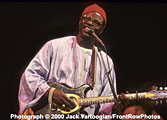
South Africa: Ladysmith Black Mambazo
Zimbabwe: Ephat Mujuru and Stella Chiweshe
Mali: Ali Farka Touré
........ Oumou Sangare
Congo: Tabu Ley Rochereau
........ Lucien Bokilo
Kenya: Fadhili William
Nigeria: Sir Victor Uwaifo
........ King Sunny Ade
Madagascar: Tarika Sammy
Cape Verde: The Mendes Brothers
The Caribbean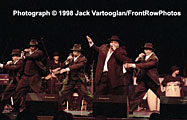
Haiti: Tabou Combo
........ Emeline Michel
Trinidad: The Mighty Sparrow
Dominican Republic: María Díaz
........ Fulanito
Puerto Rico: El Gran Combo
........ Yomo Toro
New York: Rubén Blades
Cuba: Eliades Ochoa and Compay Segundo
........ Los Van Van
........ Charanga Habanera and Gema
4
Latin America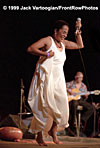
Argentina: Mercedes Sosa
........ Sandra Luna
Peru: Susana Baca
Brazil: Gilberto Gil
........ Caetano Veloso
........ Olodum
........ Daniela Mercury
Mexico: Los Tigres del Norte
Europe
Italy: Paolo Conte
Portugal: Mísia
Greece: George Dalaras
........ Haris Alexiou
Turkey: Barbaros Erköse
Hungary: Muzsikás and Márta Sebestyén
........ Kálmán Balogh
Scotland: Norman Kennedy
........ Dick Gaughan
France: Alan Stivell
Afro-European Music: Les Nubians
 Flamenco
Flamenco
Mainstream Flamenco: Carmen Cortés and Manuel Soler
........ Paco de Lucía
........ Carmen Linares
Rumba: Gipsy Kings
Arab Fusions: Radio Tarifa
North Africa and the Arab World
Andalusian Music: Hadj Mohamed Tahar Fergani
Morocco: The Master Musicians of Jajouka
Algeria: Khaled
The Classical Tradition: Simon Shaheen and Naseer Shemma
Iraq: Mahmood Anwar
 Western
and Central Asia
Western
and Central Asia
Turkey: Cinucen Tanrikorur
Iran: Kayhan Kalhor
Pakistan: Nusrat Fateh Ali Khan
India: Purna Das and the Bauls of Bengal
North Indian Classical Music: Ali Akbar Khan
........ Ravi Shankar
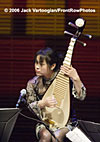 East
Asia
East
Asia
China: Wu Man
Japan: Ondekoza and Kodo
The United States
 Hawaii: Raymond Kane
Hawaii: Raymond Kane
........ Dennis Kamakahi
Native American Music: The Iron River Singers
Mexican Music: Jesse Morales “El Original de la Sierra”
Note: The choice of artists was driven both by geographical considerations and by the quality of the conversations themselves. I tried to present a range of the most articulate performers I have spoken with during more than fifteen years writing about international music. Some of these decisions were admittedly quirky, as are some of the geographical designations--listing Ruben Blades under New York rather than Panama, for example, and putting one Turkish musician in the European section and another in the section for Western and Central Asia. Rather than attempting unsatisfactory explanations, I'll just say that the histories of populations and of the world music audience have been full of quirks, and I went with what seemed appropriate to me in each case, at the moment I was assembling the collection, without presuming to create a falsely coherent picture.
Fusion and Culture-Tripping: the Two Worlds of Cooder and Sublette